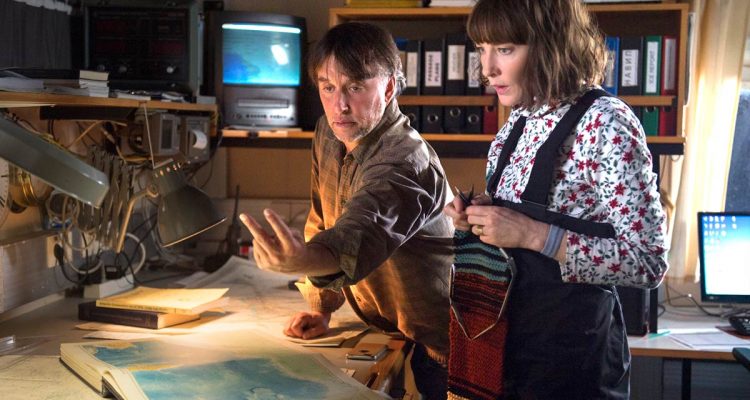Director Richard Linklater‘s “Where’d You Go, Bernadette,” adapted from Maria Semple’s popular YA novel of the same name, concerns Bernadette (Cate Blanchett) a brilliant, middle-aged ex-architect with a beautiful home, a loving husband (Billy Crudup) and a brilliant teenage daughter (Emma Nelson). And yet, with all the good graces Bernadette has gotten in life, she is going through an existential mid-life crisis. The crux of the film has to do with how Bernadette copes with her anxiety, even as the people around her, including a clueless husband, a nosy neighbor (Kristen Wiig) and a detrimental psychiatrist (Judy Greer), try to help. After her adoring, but ultimately clueless husband decides to stage an intervention, Bernadette decides to disappear, going to Antarctica which consequentially has her family going to look for her.
Blanchett’s nervous, neurotic, and irritated-filled performance keeps things going. The legendary actress once again proves just how great of a talent she is, carrying this movie on her lean shoulders for close to two hours. Meanwhile, Linklater, an American indie maverick, takes the material very seriously and plunges into the mind of a complicated and unique central character.
I spoke to the 59-year-old director of such classics as “Boyhood,” “Dazed and Confused” and “Before Sunset” about the ‘Bernadette’ shoot, whether we will ever see another ‘Before’ movie and the one film from his filmography that he wishes more people could discover.
It’s a pleasure talking to you again. Your latest film is “Where’d You Go, Bernadette,” what drew you to make it?
When [Annapurna Pictures‘] Megan Ellison gave me the book — what a complex, exciting and multileveled character in Bernadette Potts. You know you don’t see characters like that come along very often in fiction. She reminded me in a lot of ways of my own mom, you know, brilliant but pretty erratic. You could look at Bernadette in different ways, but you can’t question her love for her family. The mother-daughter relationship is very intense, I have three daughters and two sisters, so I had a front-row seat to that my entire life [laughs]. I made my mother and son movie with “Boyhood,” so this is my mother-daughter movie. That was the jumping-off point, but it was a portrait of an artist not producing her art, it was complicated. It’s also the story of a broken relationship, where husband and wife don’t seem to care about each other as much as they used to and they need to reconnect.
READ MORE: Summer Movie Preview: 35 Films You Shouldn’t Miss
The mother/son element was the spark that took you forward in tackling this as your next movie?
It was a pretty good storytelling challenge. However, it was also a challenge to adapt this unique and very unconventional book. How to tell this story cinematically, I thought that was a challenge as well.
READ MORE: The 100 Most Anticipated Films Of 2019
The movie also has a female lead, which has been a rarity in your career.
[Cate Blanchett and I] kind of met a few years ago. It was wonderful coming together for this. We talk a lot about some of the best actresses ever, well, history will say that Cate is part of that club. I got into her wavelength, and she was trying to get on mine too. It’s an intuitive process, and she brought everything she had to the role. There’s a genius in her, which can’t be described, but then there’s the work ethic which can be characterized, and Cate came to work every day willing not just to work hard but dig in and have fun. She is not this diva/crazy person that someone with her kind of celebrity and fame may succumb to. I can’t say enough good things about her.
Throughout your career, you’ve managed to jump back and forth between indie and studio filmmaking. How have you made that jump seem so effortless in your career, to the point where, yeah, you can make movies with unknowns like “Everybody Wants Some,” and then jump into a Cate Blanchett-led movie?
Well, it’s not that different an experience as you might think. I push it all through the same process. I can’t help it; it’s just kind of how I like to work and how I operate by trying to tell stories cinematically. It’s just that specific stories require different things, ‘Bernadette’ was just this kind of epic journey and, yet, it’s still this very intimate character piece, maybe with a little more trappings around it, but I never got lost in the weeds of that, I just focused on the characters.

